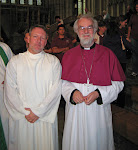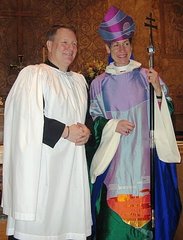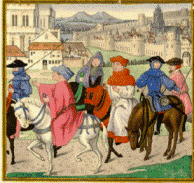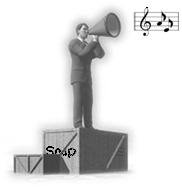Yes, Catholic! And One, and Holy, and Apostolic... These terms are called the 'Four Marks of the Church' and there's a pretty good explanation of their meaning and use on Wikipedia.
Almost all Christians use the Apostles Creed, and most use the Nicene Creed,  and in each of these the term 'catholic' is used to describe the church. In these contexts, catholic is taken to mean 'universal', as it does in the original Greek. By universal, we mean that God's grace through Jesus Christ is available to everyone, everywhere at all times and in all places.
and in each of these the term 'catholic' is used to describe the church. In these contexts, catholic is taken to mean 'universal', as it does in the original Greek. By universal, we mean that God's grace through Jesus Christ is available to everyone, everywhere at all times and in all places.
 and in each of these the term 'catholic' is used to describe the church. In these contexts, catholic is taken to mean 'universal', as it does in the original Greek. By universal, we mean that God's grace through Jesus Christ is available to everyone, everywhere at all times and in all places.
and in each of these the term 'catholic' is used to describe the church. In these contexts, catholic is taken to mean 'universal', as it does in the original Greek. By universal, we mean that God's grace through Jesus Christ is available to everyone, everywhere at all times and in all places.As Bill Cain, SJ pointed out once at a meeting at the Church of Saint Francis Xavier, there's a innate contradiction in the idea of a "Roman Catholic" church. Can you be universal and yet require obedience to the Bishop of Rome? Most Anglicans, Lutherans, Eastern Orthodox and Protestants would answer 'no'. As Ed Condry, canon treasurer of Canterbury Cathedral, pointed out during a recent session of the Canterbury Scholars, Anglicans have always considered our branch of the universal church a temporary approximation of the unity that we will find in the ultimate kingdom of God that awaits us at the end of time. We don't claim exclusive rights to the salvation of Christ Jesus. Rather, we claim that that salvation is Christ's gift to all humanity.
And in the Episcopal Church, we practice our catholicity every Sunday. In the Episcopal Church all baptized Christians are invited to partake of the Eucharist. Our baptism makes us Christians, and Christianity, as we understand it, is catholic by definition. And every Christian of every stripe is welcome at God's table.







No comments:
Post a Comment